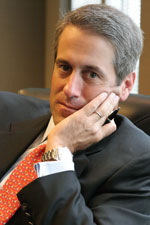
By Mark DeMoss, president of The DeMoss Group and a supporter of Mitt Romney for President
I have something in common with Jimmy Carter, Bill Clinton, Al Gore, and, Mike Huckabee—we all claim affiliation with the Southern Baptist Convention, meaning we would all profess to be “born again” Christians. Personal faith has moved front and center in this presidential primary season thanks in large part to the candidacies of Mike Huckabee, who has run as much as a Southern Baptist preacher and a “Christian leader” as a former governor, and Mitt Romney, a former governor with a now well-known Mormon heritage.
First, Article VI of the United States Constitution prohibits it: “No religious test shall ever be required as a qualification to any public office or public trust under the United States.” This spring, I was speaking to a group of pastors in a southern state and one of spoke up, saying he was “concerned about Mitt Romney’s faith tradition,” and was therefore waiting for Fred Thompson to enter the race. “Let me ask you a question,” I said. “What do you know about Senator Thompson’s faith tradition?” After a brief pause, he looked back at me and said, “Well, I know he’s a Protestant.” In the span of two short sentences this Baptist pastor seemed to rule out one candidate while selecting another on the basis of their faith alone. I submit that a more complete vetting process is in order when evaluating potential American presidents.
Second, we don’t apply this spirituality test to any other aspect of our lives. If I were to choose a candidate based primarily on a personal faith most like mine, I would have endorsed the former Arkansas governor long ago. But I don’t choose a doctor using this test, I didn’t choose my architect or homebuilder this way, and the Christian university where I sit on the trustee board didn’t hire our new athletic director solely because he was “one of our own” spiritually. Why then would we use this criterion alone, or even primarily, when choosing something as important as the president of the United States?
It was religious conservatives who catapulted another Southern Baptist, Jimmy Carter, from relative obscurity to the White House in 1976, primarily on the basis of his public pronouncements of his “born again” Christian faith. Ironically, most mainstream Southern Baptists don’t consider Mr. Cater to have been a good president and now don’t even claim him as a fellow-Southern Baptist. Indeed, while one’s faith determines his salvation, it should not determine his electability
Third, our political system and election process tempts both the exploitation and the selective use of a candidate’s personal faith. For example, Mike Huckabee ran a TV ad in Iowa and South Carolina that identified him as a “Christian leader” and showed him telling potential voters, “Faith doesn’t just influence me, it really defines me.” Curiously, however, this ad wasn’t running in New Hampshire, a critical early primary state which lacks the evangelical fervor of Iowa and South Carolina.
The Wall Street Journal reported that during a recent three-day campaign swing through the Granite State, where economic conservatives outnumber religious ones, Gov. Huckabee did not mention his faith, abortion, or marriage unless he was specifically asked. While this politically astute strategy may have been the work of a campaign consultant rather than the candidate himself, I believe the governor would agree that our faith should define us in all 50 states, or not at all.
Finally, candidates often develop a sense of religious entitlement which is both dangerous and unfair. For example, Mr. Huckabee expressed his frustration at some fellow Southern Baptists who had not endorsed him, telling the New York Times Magazine, “They make ‘electability’ their criterion. But I am a true soldier for the cause. If my own abandon me on the battlefield, it will have a chilling effect.”
Dismayed that Focus on the Family founder James Dobson has yet to publicly signal his choice for 2008, Huckabee had this to say: “I just don’t understand his neutrality. I’d be an obvious choice for his endorsement. We’re old friends. I love him, and I love his wife Shirley. I just don’t know how to explain it.” I can think of a few possible explanations: Dr. Dobson intends to support someone else, or no one, or perhaps to support the governor later—all of which he is entitled to do.
To the extent that faith has played too big a role in this election cycle, the blame can probably be shared among certain campaigns, the media, religious leaders, and an electorate often content to settle for one-dimensional descriptions of candidates.
Personally, I would like a president to be a man or woman of faith, whether or not it mirrors my own. But I also want them to have relevant executive experience, proven management experience, intellectual capital, crisis-tested decision-making skills, enough government experience to understand how government works—but not so much that they only know how to work for the government. In other words, as with every other personnel choice in life, I want competence.
I believe faith plus character plus experience plus competence is a recipe for the ideal presidential candidate. But faith alone should neither disqualify one from getting my vote, nor guarantee that they will. A candidate’s character cannot be overstated; his or her faith can be, and in this election probably has been. Specifically, Mitt Romney’s faith should not cost him votes, and Mike Huckabee’s faith should not assure him votes.
A few days ago, Mike Huckabee weighed in on this very issue, telling a television journalist, “I don’t think a person’s faith ought to be a plus or a minus. It ought to be their character.” Amen!
The DeMoss Group is an Atlanta-based public relations firm which works primarily with evangelical organizations and causes. DeMoss, a former chief of staff to Jerry Falwell, is author of The Little Red Book of Wisdom.

